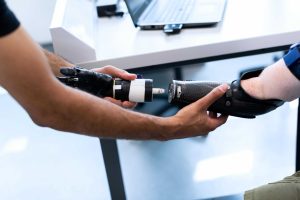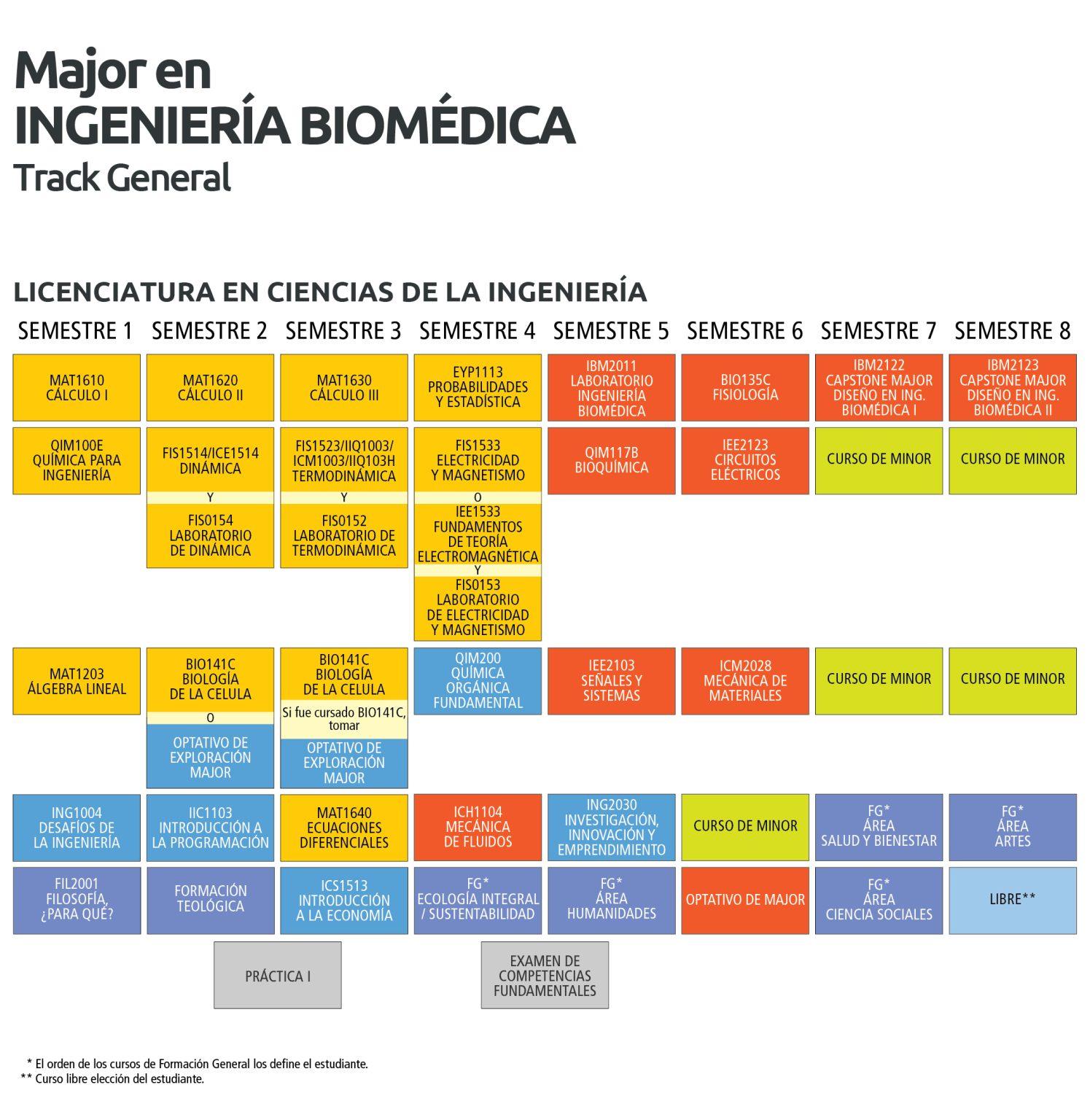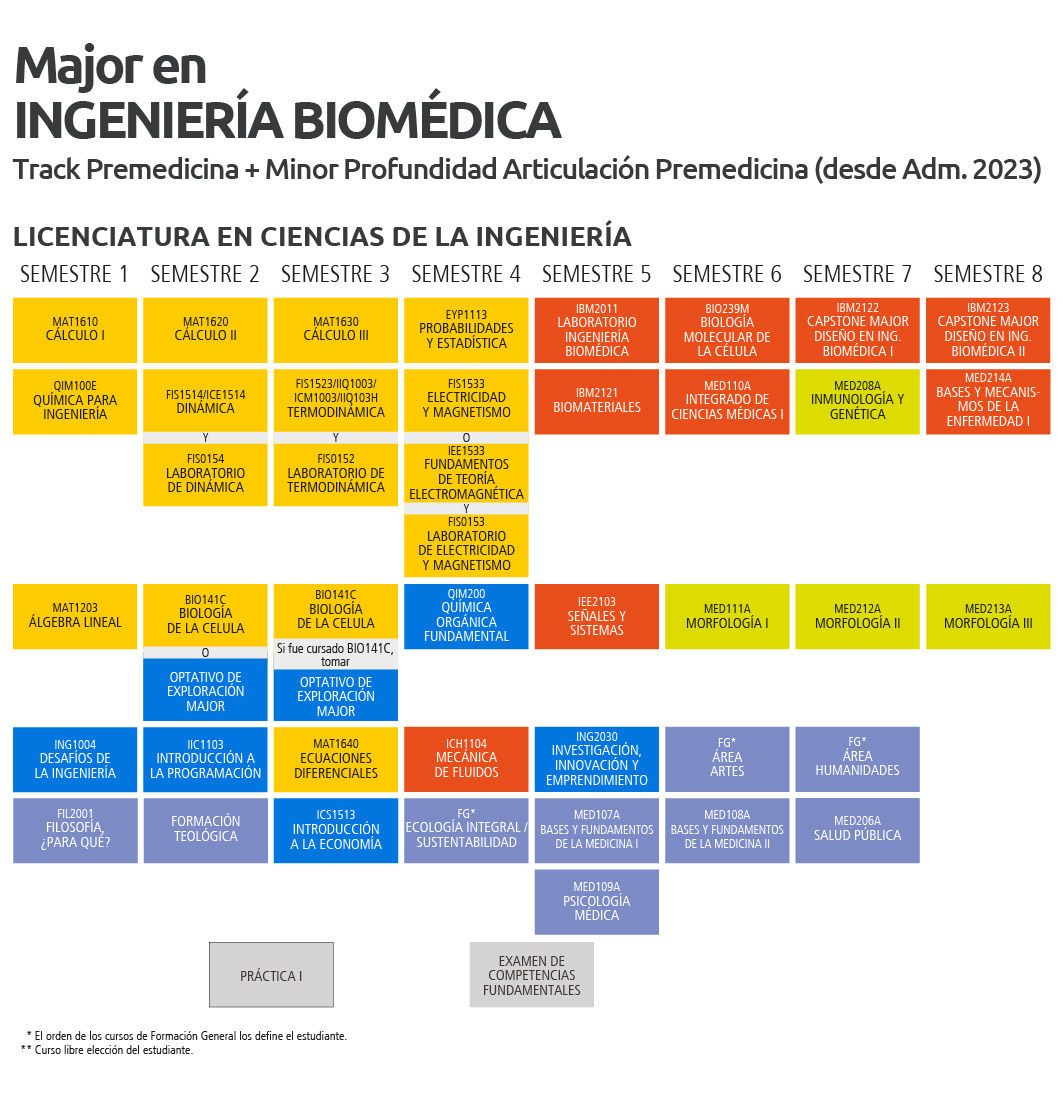
Major in Biomedical Engineering
About the program

Biomedical Engineering provides innovative and technological solutions to improve the quality of life of patients, optimize clinical processes and advance biomedical research through an interdisciplinary approach.
Through the Major in Biomedical Engineering, students will develop the ability to apply innovative solutions to health problems with an interdisciplinary approach, articulating their knowledge to perform in various projects. The program has a limited number of vacancies (24) so a selection process is required.
For more information visit the following sitelaunch.
Curriculum


Continuity of studies
Students can opt for the following alternatives after completing their bachelor's degree:
- Continuation to a professional degree of Civil Engineer UC. Related degrees are: Civil Electrical or Mechanical Engineer and Civil Engineer of Industries with a Diploma in Mechanical Engineering or Electrical Engineering.
- Continuity to the UC Medical Surgeon degree in combination with the Premedicine Track (prior acceptance into the program).
- Continuity to the professional degree of Civil Engineer UC and articulation to the Master in Engineering Sciences, Master in Engineering or PhD in Engineering Sciences UC. Requires application to the Postgraduate program.
- To pursue a Master's or Doctoral degree in Biological and Medical Engineering. Requires application to the graduate program.
- Completion of a postgraduate degree (master's or doctorate) from UC or another institution. Requires application to the graduate program.
- Exit to the Labor Market: Entrepreneurship or early employment.
Student delegate Major
Frequently Asked Questions
- Empresas de equipos de diagnóstico, monitorización y terapia médica
- Empresas de tecnología biomédica
- Empresas farmacéuticas
- Empresas de biotecnología
- Departamentos de ingeniería clínica de los hospitales
- Universidades e institutos de investigación
- Agencias y empresas de evaluación y de transferencia de tecnología sanitaria
- Emprendimiento propio – innovación y desarrollo
- Start-ups en general
Las principales áreas de investigación del IIBM son: Imágenes Biomédicas, Biomecánica y Fisiología Cuantitativa, Ingeniería Celular y Molecular e Ingeniería de Tejidos.
La investigación que desarrolla un ingeniero biomédico considera herramientas más cuantitativas (matemáticas, biofísica). Sin embargo, la diferencia de la investigación dependerá del investigador. Asimismo, es común encontrar ingenieros biomédicos trabajando en equipos con bioquímicos, ya que son especialidades científicas altamente complementarias.
El Major en Ingeniería Biomédica se centra en aplicaciones para salud humana usando la ingeniería como herramienta principal, mientras en caso del Major de Ingeniería Biológica se centra en el uso de la biología (principalmente celular) como herramienta para distintas aplicaciones, incluyendo aquellas del tipo médicas, de ingeniería, procesos, entre otras. Hay intersección entre ambos programas.
Los alumnos ingresan a la carrera a través del plan común de ingeniería. El plan común consiste en cursos básicos de ciencias (matemáticas, física, química) y herramientas transversales que necesita cada ingeniero, independientemente de su especialidad. Se sugiere tomar el curso exploratorio el tercer semestre, cuando el alumno postula y declara su major. En el cuarto semestre se solicita el primer curso del major y finaliza el plan común.
El Major en Ingeniería Biomédica tiene un número limitado de vacantes por año de admisión (24 estudiantes), por lo que se debe participar de un proceso de selección. Las fechas concretas son comunicadas anualmente por la Dirección de Pregrado de la Escuela de Ingeniería UC.
El Major en Ingeniería Biomédica ofrece dos caminos para llegar al título profesional:
- Si un alumno sigue el Track General, finaliza su primer ciclo obteniendo la Licenciatura en Ciencias de la Ingeniería, pudiendo posteriormente continuar con alguno de los títulos tradicionales que ofrece la Escuela de Ingeniería.
- Si un alumno elige el Track de Premedicina, el cual considera 5 vacantes por año de admisión, después de su aceptación y cumpliendo los requisitos necesarios, finaliza su primer ciclo obteniendo la Licenciatura en Ciencias de la Ingeniería, continuando sus estudios en Medicina. Luego de terminar los cursos correspondientes, obtiene el Título de Médico Cirujano UC. El Track de Premedicina no da derecho a continuar un título profesional en Ingeniería.
No, el título profesional de Ingeniero Civil Biomédico no existe actualmente. Tras terminar su licenciatura los estudiantes pueden optar por las siguientes alternativas:
- Continuidad a un título profesional de Ingeniero Civil UC: los títulos afines son Ingeniero Civil Electricista o Mecánico e Ingeniero Civil de las Industrias con Diploma en Ingeniería Mecánica o Ingeniería Eléctrica.
- Continuidad al título Médico Cirujano UC en combinación con el Track de Premedicina (previa aceptación en el programa).
- Continuidad al título profesional de Ingeniero Civil UC y Articulación al Magíster en Ciencias de la Ingeniería, Magíster en Ingeniería o el Doctorado en Ciencias de la Ingeniería UC. Requiere de postulación al programa de Postgrado.
- Realizar un grado académico superior de postgrado (magíster o doctorado) UC o de otra institución. Requiere de postulación al programa de Postgrado.
- Salida al mercado laboral: Emprendimiento o empleo temprano.
Los títulos más afines con el Major en Ingeniería Biomédica, Track General, son Ingeniero Civil Electricista o Mecánico, e Ingeniero Civil de las Industrias con Diploma en Ingeniería Mecánica